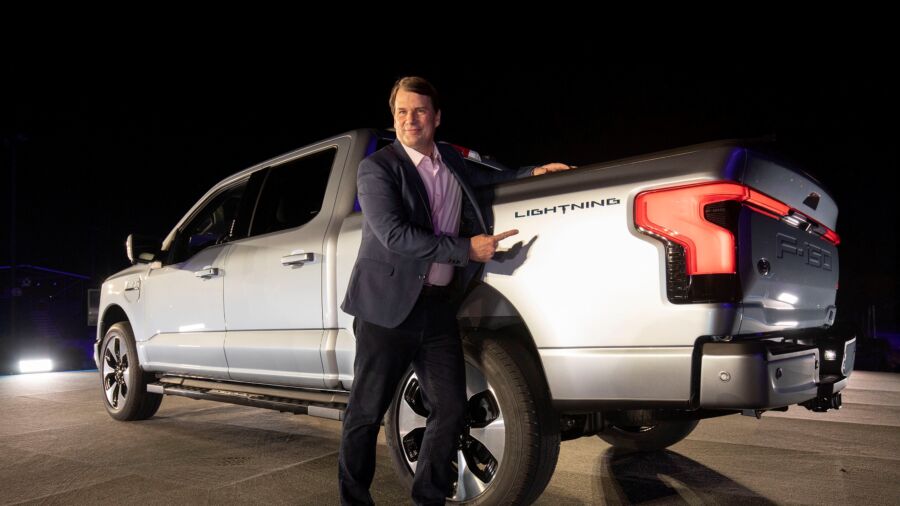Dozens of Republican House Energy and Commerce Committee members sought to review the licensing agreement between Ford Motor Co. and a Chinese electric vehicle battery maker.
In a letter sent to Ford’s CEO James Farley, the Republicans, led by committee chair Rep. Cathy McMorris Rodgers (R-Wash.) and Oversight Subcommittee Chair Morgan Griffith (R-Va.), asked for a copy of the licensing agreement and all Ford’s communications on the deal’s eligibility for tax credits.
The lawmakers were concerned that Ford’s deal with the Chinese EV battery maker “could aid China’s efforts to expand its control over United States electric vehicle supply chains and jeopardize national security by furthering dependence on China.” They wrote that such national security risks would become “serious” “at the time of escalating geopolitical tensions.”
In February, Ford announced that a new $3.5 billion plant would be built in Marshall, Michigan, 100 miles west of Detroit, to produce lithium-iron-phosphate batteries, better known as LFP, a type of battery that’s cheaper but less energy-dense than the nickel-cobalt-manganese batteries that currently dominate the market.
A wholly owned subsidiary will own the factory and employ the workers, Ford said, while China’s Contemporary Amperex Technology Co. Ltd. (CATL), as part of a licensing agreement, will provide the EV battery technology, some equipment, and workers. CATL is the world’s largest manufacturer of EV batteries and is known for its dominance in LFP batteries. Ford expects production to begin in 2026, with the plant estimated to produce enough batteries for 400,000 EVs each year.
Ford previously confirmed with The Epoch Times that it expected the deal to qualify for both consumer and advanced manufacturing credits under the Inflation Reduction Act (IRA). Experts estimated that the manufacturing credit could reach $1 billion and said Ford couldn’t afford the $3.5 billion investment without the tax credit.
House Energy Committee Republicans further questioned Ford’s decision-making process and the potential exploitation of federal incentives under the IRA, designed by Congress to promote domestic EV supply chains.
A Ford spokeswoman told The Epoch Times in an email: “When we formally receive the letter, we’ll respond and again correct rampant misinformation about this project.
“Here are the facts: Ford alone is building and will own and run this battery plant in Michigan. We’re doing that instead of putting a Ford battery factory in another country, or exclusively buying these batteries made in China, like our competitors do. Ford has no ‘partnership’ with CATL; they won’t own any portion of the plant. We’re licensing their battery cell technology for use by Ford in the U.S. and will contract with them for specific services, nothing more.”
“The project will create 2,500 new American jobs and help strengthen U.S. manufacturing. It’s a big win for our customers, our country, and our business,” she continued.
The Ford-CATL deal sparked security concerns months before its announcement when Virginia Republican Gov. Glenn Youngkin pulled his state from bidding for housing the battery plant, citing that the facility might become a “front” for China.
Since then, Republican lawmakers have called for reviews of the deal for national security risk assessments.
About two months ago, Rep. Mike Gallagher (R-Wis.) and Rep. Jason Smith (R-Mo.), the respective chairmen of the House Select Committee on China and the House Ways and Means Committee, also wrote to Mr. Farley, seeking to review the licensing agreement.
They are concerned that the deal will facilitate China’s global dominance in electric vehicle (EV) battery technology with U.S. taxpayers’ money and increase America’s reliance on Chinese critical raw materials. According to their letter, CATL’s supply chain in Xinjiang also raised a question about forced labor and the potential violation of the Uyghur Forced Labor Prevention Act.
At a committee hearing in late July, Rep. Raja Krishnamoorthi (D-Ill.), the House China panel’s ranking Democrat, emphasized the concept of the Chinese Communist Party’s (CCP) military-civil fusion, saying there are no truly private companies in China. The CCP isn’t in an economic competition, he said, but in a game to “determine the values that will be embedded in the foundational technologies of day-to-day life.”
From The Epoch Times

